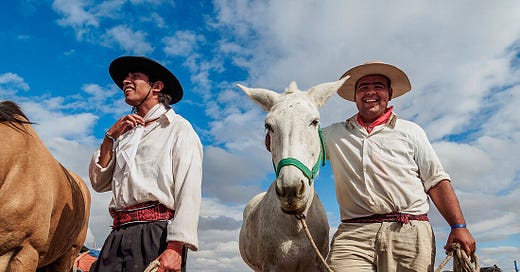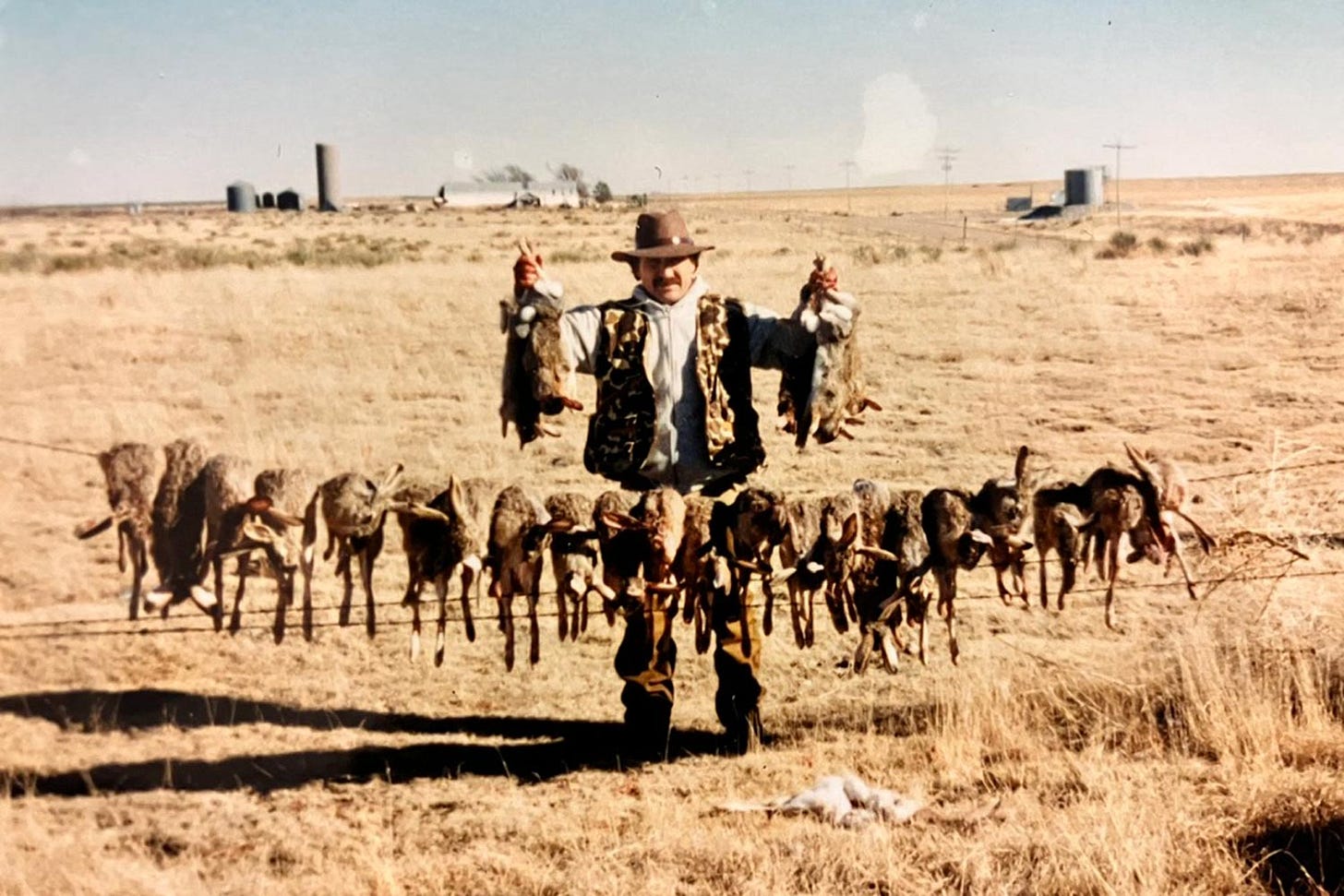The story that opens this column is a half-finished, stream-of-consciousness piece I started scribbling in September after I heard Alex Melton’s cover of Toby Keith’s “I Should’ve Been a Cowboy,” which somehow wasn’t the No. 1 song on my Spotify Wrapped, though I’ve listened to it at least 6,527 times since. I’ve been busy this week with my second draft of Paddlehands, but I didn’t want to leave you hanging. Here’s the best I could muster this morning.
In the United States, they dress little boys like cowboys and Indians. At least they did once, before they realized it was wrong to. By this point in time, most of the real cow wranglers are gone. The Indians are dead or banished to reservations to die from alcohol or soil poisoning.
In Argentina, they dress the little boys and girls like gauchos. I used to work in cultural exchange programs for the U.S. government, and we’d always have a day when the participants wore the traditional dress of their homelands. This seems to me a gimmicky way of showing appreciation now, but the white American who’d thought it up was from the heartland and must’ve liked the idea of representing the range of national and ethnic identities since their part of the country had none. In Bayonne, in either fourth or fifth grade at P.S. #14, we also had a culture day when kids wore clothes or brought items from their families and presented a report at the front of the class. It made sense. Even the white kids where I grew up were either Polish, Irish, or Italian. Matt Kaminski wore an Irish sweater to mismatch his Polish surname. John Ockay, whose dad was a local postman, said something about being from Czechoslovakia. Despite his English-sounding surname, Gianfranco WIlbeck’s origins were evident in his schnoz, which was the length of the Italian peninsula.
I can’t remember what I wore to class, but the Argentinians who participated in the exchange programs at work dressed like gauchos with their boinas (berets), pirate shirts, and baggy pants. Their long knives didn’t make it through customs. But they looked cool regardless.
Like any kid on the schoolyard, I wanted to be a cowboy, not an Indian. I didn’t realize I had both gene sets floating through my bloodstream. But I did know cowboys had six shooters and got to wear big hats. The problem is I never learned to ride a horse. Bayonne barely had enough grass to sustain a healthy population of anything but feral cats and raccoons. And even though there were rumors that horsemen rode on the wrong side of the railroad tracks, where the land has been razed and the factories knocked down for condos and the new Walmart (this is also, coincidentally, the wasteland from which Paddlehands emerged), I never saw them. I rode a donkey once or twice on school trips to the Land of Make-Believe amusement park, but that was it.
Even though, like the cowboys in the West, the gauchos in Argentina are a relic, and the real ones are poor as dirt (no aspiration of modern city folk), in my house, we listened to nylon-guitar string folk music from the pampas, the grasslands that remain home to many of Argentina’s mixed-race cattlemen. Atahualpa Yupanqui, Jorge Cafrune, Los Chalchaleros. My great-grandfather on my dad’s side was a gaucho in the province of Santa Fe who died of a heart attack in the middle of family asado. Nono had a share-cropping family in the province, too, and was sent to the farm for summers as a boy to help feed and water the herd. He told an electrifying story of being six or seven, trudging through a thunderstorm with his sister, avoiding lightning strikes by centimeters as they walked from one shack to another miles away, before showing up just in time for a glass of red wine and a card game. Victor and I ate it up, laying on our bellies, our hands holding up our chins, in an age when spoken stories could still delight you because there was no internet.
Once, at a family dinner at Fernandes, a Brazilian steak house in Newark, a trio of Portuguese acoustic players came to the table hoping to exchange a song for cold, hard cash. Nono shooed them away. But in doing so, he’d given away enough of his accent that they went straight into a rendition of Yupanqui’s famous milonga, “Los Ejes de Mi Carrete,” about a gaucho being told to grease the wheels on his creaky cart (Wikipedia summarizes it much better). By the second verse, Nono’s eyes dripped like a creek along a dry, dirt road. “The road is too long and lonesome, too long and lonesome, without a thing to distract me,” the Portuguese man sang. Nono may have stuck a $100 bill in the singer’s pocket, but all I remember are the tears.
In 2017, the Apocalyptic Cowboy took me shooting at the Oak Ridge Sportsman’s Association, where we drove by a crew of retirement-age men dressed up like characters on the set of Butch Cassidy and the Sundance Kid. He explained that they were cowboy 3-gun shooters. AC didn’t participate, for he had larger, more powerful weapons to blast into the side of a buffalo or a liberal if he needed to. But he said it’d be smart if I learned to handle a revolver and ride a horse by Trump’s third term. This seemed impractical for my lifestyle, but I was a fan of Colter Wall’s music, so I did at least ask my dad to borrow one of the pinched-front hats he wore in the days he and his Portuguese buddies drove to Kansas to shoot jack rabbit and pheasant the next time I was him. I didn’t wear it out because I knew people would be able to tell I was an imposter. But I mustered the stupidity to put it on when I went to see Wall play The Bijou in December 2019, where I sat in the front row as he played a cover of Stan Jones’s “Cowpoke.”
I fell in love with the song. To this day, on wintry evenings when I fight the depression of bleeding money from my bank account by telling myself Jesus likes the poor better anyway, I walk upstairs from writing and bellow out, “I ain’t got a dollar in these old worn-out jeans, so I’ll stop eating steak and go back to beans.” Haley rolls her eyes, and the kids giggle. Because we hardly eat steak anyway. If we do, it’s from the discount grocery outlet, UGO. And Haley only buys black and kidney beans at Aldi, not the porky, honey-sweet kinds, as she says they’ll kill me quicker than any Indian who isn’t already in my family could.
In one of my thousands of daydreams, somewhere between homesteading and buying an RV to live with my family in the parking lot of Yellowstone National Park, I do make it out west and thrill the kids around a campfire with stories of a life well-lived. I wear long-sleeve denim shirts and Stetson hats. I eat pork beans from an aluminum can and ride my pony to the river to catch wild cutthroat trout at sunrise.
Sometimes, as the Toby Keith song says, I feel as if this should’ve been my life, not the one in which I spend 90% of my time, whether working or playing, in front of a screen. I am certain it’s a better life, though a much harder one. I think that’s why we listen to songs about lives we don’t have, because it’s easier to imagine than to do. “Normally, if given the choice between doing something and doing nothing, I’ll do nothing,” the character Ron Swanson says in an episode of Parks and Recreation (a show with its fair share of settler-Indian drama). “I’d work all night if it meant that nothing got done.”
In this season of life, I feel like I’m doing a heckuva lot of nothing. But cowboys didn’t do nothing. Indians didn’t do nothing. They were out there, gutting mule deer, drinking whiskey beneath the stars, closer to the Lord than I’ll ever get inside these four insulated walls. I should’ve been a cowboy.
Words from the Wise
Mi gloria es vivir tan libre / Como el pájaro del Cielo, / No hago nido en este suelo / Ande hay tanto que sufrir; / Y naides me ha de seguir / Cuando yo remonto vuelo
(Translation: “My glory is to live as free / As the bird up in the sky / I make no nest on this earth / Where there’s much pain to endure / Yet I know it will not follow / When I do take wing and soar.”)
José Hernández, El Guacho Martin Fierro
Useful Trivia
Despite being portrayed in popular American media as white dudes who look like Clint Eastwood, a quarter of all cowboys in the West were black. One of the first great rodeo stars, Bill Pickett, was born to former slaves in Texas in 1970 and became famous for catching stray cows by biting their lower lips and wrestling them to the ground (what eventually became known as bulldogging or steer wrestling). He was the first black honoree in the National Rodeo Hall of Fame in 1972.
More reading:
“The Lesser Known History of African-American Cowboys,” Smithsonian Magazine
What I’m Reading
I started listening to The Barn: The Secret History of a Murder in Mississippi by Wright Thompson about the murder of Emmett Till. It’s heavy. By coincidence (or rather providence), I also flipped open last month’s copy of The Atlantic to find a related Thompson story about traveling to Spain to find the first map of the Mississippi delta made by Spanish conquistadors in the 1500s.
Fiction novels have become nearly impossible for me to read in this season of life, as I can’t keep awake beyond two or three pages. I’m putting down One Hundred Years of Solitude around page 350 and switching over to The Gay Talese Reader: Portraits and Encounters, a compilation of some of the legendary narrative journalist’s best writing. One of my favorites, “The Loser,” about the boxer Floyd Patterson after his second knockout loss to Sonny Liston, was reprinted years ago by Deadspin.
What I’m Listening To
The Italian math rock band Stegasauro.
Metalcore, a lot of it. Specifically, I’m deep in A Plea for Purging listening hole. I even have Enzo, a future metal drummer, walking around the house grunt-screaming lines like “I LIKE TO EAT FROZEN FRUIT EVERY DAY.” Haley loves this, by the way.
While wrapping up this story, I shuffled Atahualpa Yupanqui’s tracks on Spotify. You won’t understand him if you don’t speak Spanish, but you’ll appreciate them if you like folk-style guitar.
What I’m Watching
Really, I haven’t watched The Rider this week. But it’s the best cowboy movie I saw alone at Regal Downtown West in the season of life when I went to the theater all the time. It’s a somber indie and the second film Chloe Zao made before becoming famous for Nomadland.
The second season of Silo on AppleTV+!
Haley and I are also flip-flopping The Chosen, a show about Jesus and his followers, and Shrinking, a show about what happens when you try to solve life’s major problems without consulting Jesus first. It’s funny, though.
Before you leave, support my work by upgrading to a paid subscription for as little as $4.17/month ($50/year), buying me a coffee, or ordering a copy of my first story collection, Big Head on the Block. You can also listen to my stories on YouTube and Spotify.






